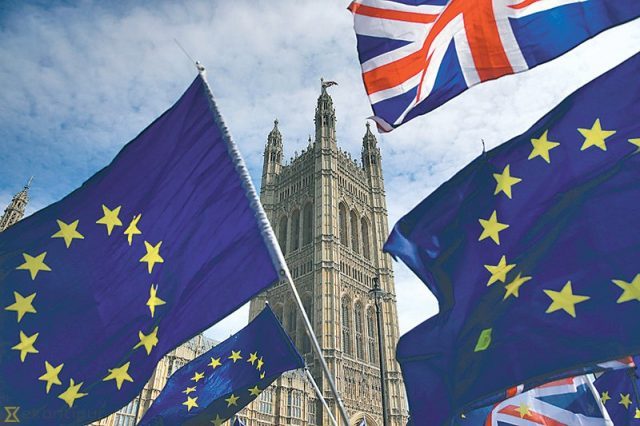AFP |
Britain warned Monday there were still “big issues” to resolve in Brexit negotiations with the European Union, even as hopes grow in Brussels of a breakthrough just days before a crucial summit.
Technical discussions resume in Brussels this week, with both sides racing to bridge their differences over the toughest issues of the Irish border and future trading ties. The EU summit on October 18 has been characterized by the bloc as a “moment of truth” in the divorce talks, just months before Britain leaves on March 29, 2019.
A senior EU official involved in the Brexit negotiations told AFP that the document may be intentionally vague, in case Britain wants to change its red lines in the future.
European Commission President Jean-Claude Juncker said at the weekend that the chances of a deal are now rising. British Prime Minister Theresa May’s spokesman said the government was “working hard for a deal this autumn and that continues at pace”.
But he added: “There remain big issues to work through and as the prime minister has said, this will require movement on the EU side.
Read more: Britain and EU face trade differences in Brexit talks
“There is a difference between people talking optimistically about a deal, and a deal including both the withdrawal agreement and the future framework actually being agreed,” he said.
‘Precise’ Trade Declaration
As months of negotiations come to a head, tensions erupted last month at a summit in Salzburg where the EU roundly rejected May’s plan for closer economic ties after Brexit.
But she is sticking to her proposal, which she argues would protect cross-border trade while also resolving the problem of how to keep open Britain’s land border with Ireland.
Business leaders, meanwhile, called for politicians to focus on getting a Brexit deal.
The first sign of any common ground will come on Wednesday when EU negotiator Michel Barnier will present the first draft of his proposed statement on post-Brexit economic and security ties to ambassadors of the EU’s other 27 member states.
A senior EU official involved in the Brexit negotiations told AFP that the document may be intentionally vague, in case Britain wants to change its red lines in the future. However, May’s spokesman said Britain was seeking a “precise” declaration on the shape of the future relationship.
Read more: Anti-Brexit campaigner seeks to ‘end the chaos’
He noted that MPs in the House of Commons will have to approve the statement alongside the Brexit divorce deal, and would want to do so “on an informed basis”. The divorce deal covers the issues of Britain’s financial settlement and EU expatriates’ rights, which are largely resolved, as well as the issue of Ireland.
London and Brussels agree they want no return to physical border checks between British Northern Ireland and EU member Ireland, but disagree on how to achieve this. Britain believes checks can be avoided through a new trade deal but accepts the need for a fall-back plan a backstop to ensure this until that deal can be agreed.
“No matter how fed up we are with the running in circles of it all, we have to do everything within our power to avoid no deal,”
London has rejected the EU’s proposal but has yet to put forward in full an alternative, promising only it will be published “shortly”. The problem stems from Britain’s desire to leave the EU’s single market and customs union after Brexit, which would inevitably mean the reintroduction of checks in Ireland.
Britain is keen to develop its own independent trade policy and welcomed a declaration by Japanese Prime Minister Shinzo Abe on Monday that it could join the Pacific trade deal. Business leaders, meanwhile, called for politicians to focus on getting a Brexit deal.
Read more: Why Britain’s Brexit Deal can only be Inferior to the EU…
“No matter how fed up we are with the running in circles of it all, we have to do everything within our power to avoid no deal,” said Carolyn Fairbairn of the Confederation of British Industry (CBI) lobby group.
© Agence France-Presse














